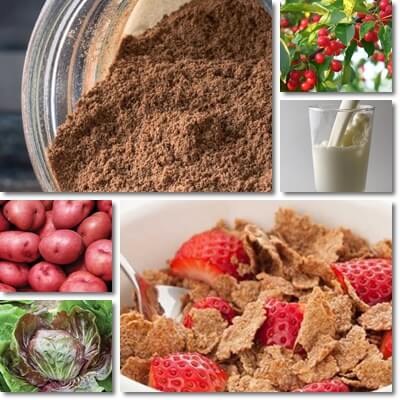No food is going to make you fall asleep as soon as you plop your head on the pillow. Foods don’t work like that. But some foods do help with sleep.
There are foods that are good to eat at night if you have sleep problems.
Foods high in magnesium and foods that naturally contain melatonin can help tackle some of the most persistent underlying causes of insomnia, with the most surprising results.
Changing your nighttime diet to include some of these foods can have marked benefits for your sleep, including benefits such as reduced time until falling asleep and improved quality and possibly even longer duration of sleep. Of course, dietary changes take a while to produce effects, so don’t expect these foods to act as a sedative pill and take you out in two minutes.

(1) Bananas
Bananas are one of the best foods to eat for sleep. What makes bananas good for sleep is their good content of potassium (8% of daily requirements) and magnesium (also 8%). Both potassium and magnesium in bananas help with sleep by acting on the cardiovascular, muscular and nervous system to induce a state of physical and mental relaxation that is conducive to sleep.
Potassium in bananas relieves pressure in blood vessels and actively lowers blood pressure. Magnesium in bananas acts on the nervous system to induce muscle relaxation and reduce muscle tension, muscle cramps and muscle aches and pain, also helping prevent painful leg cramps at night that disrupt sleep.
Magnesium is also directly involved in lowering heart rate and blood pressure which helps induce a state of physiological calm and relaxation that encourages falling asleep and promotes a more restful sleep with sufficient deep sleep.
Bananas are also naturally high in vitamin B6 (30% of daily values) which is involved in serotonin production – serotonin is a neurotransmitter that helps boost mood and reduce anxiety, favoring sleep. Vitamin B6 is also involved in the production of GABA, or gamma-Aminobutyric acid, which is a neurotransmitter with an inhibitory effect on the nervous system. GABA reduces excitability of neurons throughout the nervous system which can have a positive effect on sleep.
The neurotransmitter is also more distantly involved in the production of a precursor to melatonin, from serotonin, which helps regulate circadian rhythms, with benefits for sleep.

(2) Potatoes
One of the best foods to eat at night for better sleep is potatoes. Ideally, you want potatoes with no added fats, or very little of them, such as boiled potatoes, or boiled potatoes that are oven roasted for a little crunch. Why potatoes of all foods?
For one, potatoes are a good source of dietary potassium (9% of daily values per 100 g) and also contain some magnesium (6% of daily values). Both potassium and magnesium in potatoes lower blood pressure, heart heart, combat muscle tension, muscle fatigue and muscle cramps, aches and pains. The two minerals induce relaxation that favors sleep.
There are also other reasons why potatoes are good for sleep. For one, potatoes are less than 0.1% fat and around 79% water which means they are easy on the stomach and get digested fairly quickly which makes them a good food to consider eating at night. Potatoes are also bland and will not cause side effects such as acid reflux at night which can delay falling asleep, reduce sleep time and quality (for example, acid reflux at night can affect sleep by causing you to wake up regurgitating acidic stomach juices or coughing).
(3) Protein bars or protein shakes
It may seem unorthodox, but protein bars and protein shakes are good to eat at night for better sleep, so long as you choose options without cocoa, chocolate or additives that cause acid reflux. Instead of your regular dinner, you can have two protein bars or a protein shake made from whey protein powder. The benefits of having protein bars or protein shakes for sleep:
- They fill you up and keep you satiated for hours, stopping you from waking up in the middle of the night to eat.
- They are low-fat and do no cause digestive issues (provided they are quality products).
- The amino acids that make up protein actively regulate neurotransmission and nervous system activity, with a positive effect on sleep-wake cycles.
- Amino acids such as Glutamine act as neurotransmitter inhibitors, exerting a depressing effect on the nervous system which promotes relaxation and favors sleep.
Note: The quality of the protein bars and shakes will determine their effects on sleep.
Note: You can have a protein bar with a piece of fruit such as a banana, or make your protein shake with a glass of low-fat dairy milk to supply more magnesium for sleep benefits.
(4) Cherries, sweet and tart
Studies have shown that cherries, both sweet and tart, and cherry juice are good for muscle recovery post-workout, gout and arthritis pain, and help promote sleep. What makes cherries a good food for sleep? Both the fruit and juice contain potassium, magnesium, tryptophan and melatonin, all compounds that induce sleep and promote sufficient and restful sleep.
Consumption of cherries and cherry juice as a sleep aid has been shown to improve sleep markers such as wake time after sleep onset, increase total sleep time by up to 90 minutes as well as improve quality of sleep by lowering blood pressure, regulating heart rate and reducing stress and anxiety and muscle and joint aches and pains owed to inflammation.
See more benefits of cherries and cherry juice for sleep.
For the most benefits for sleep, it’s recommended to eat cherries or drink cherry juice twice a day, such as in the morning and evening, or once a day, two to three hours before bedtime. Amounts such as 200 g of fresh fruit or 8 ounce juice servings are known to produce effects.
(5) Low-fat dairy milk
Low fat dairy milk such as cow’s milk is one of the best foods for sleep. For one, it’s low in fat which means it gets digested more easily and should not cause stomach upset later on during the night, allowing for restful sleep. Essential and non-essential amino acids in low fat milk help synthesize neurotransmitters in the brain with benefits for mood, appetite and sleep.
Milk is high in water and naturally hydrating, and helps support muscle function and the cardiovascular function whose optimal status promotes physiological wellbeing conducive to sleep. Low fat milk in particular is a good source of dietary minerals such as potassium and magnesium and restores electrolyte balance, lowers blood pressure, heart rate and combats painful cramps, with benefits for sleep.
Of course, dairy milk is not a good option for you if you don’t already drink it regularly. If you’ve been off dairy milk for months or years, you have to reintroduce it very slowly into your diet over the course of one or more years to be able to digest it well and enjoy benefits for sleep.
It’s important to choose low-fat or non-fat dairy milk to reduce the chances of experiencing acid reflux at night. Equally important, if you’re not already a milk drinker, pair the milk with some other food such as boiled potatoes in a simple mash, one or two quality protein bars, a banana, rice crackers etc.
(6) Breakfast cereals
It might sound counterintuitive to do so, but you can eat fortified breakfast cereals at dinner time for better sleep. Fortified breakfast cereal contain grains that provide both energy and satiety, preventing you from waking up hungry from your sleep. Breakfast cereals with whole grains are naturally rich in magnesium and also have potassium with benefits for sleep. Fortified options also contain B vitamins and vitamin D which further help sleep.
Pair the cereal with low fat dairy milk for an extra dose of potassium and magnesium, and make sure you eat them two or three hours before lying down to sleep. Also, avoid cocoa or chocolate cereal to avoid stimulants in cocoa such as caffeine and theobromine.
(7) Chicken and greens salad
A real meal, you can say. For dinner you can have boiled, grilled or baked chicken, seasoned plainly with salt and non-spicy herbs (no paprika, no garlic, no onions, no turmeric, no ginger, no butter, no mayonnaise, no vinegar, no lemon juice, no soy sauce). You can pair it with a simple salad made from leafy greens (you can choose between arugula, baby spinach, grated carrot, Belgian endives or other types of chicory).
Chicken is easy on the stomach and will not cause acid reflux or stomach upset, but also satiates, inducing a state of calm and relaxation, satisfaction even, that is conducive to sleep. Chicken is high in protein with all essential amino acids to regulate neurotransmitters in the brain that affect mood and sleep. Not to mention that amino acids help repair damage in the body during sleep which helps you wake up more rested.
Leafy greens are very low calorie and satiate, but don’t make you feel heavy, which is good for sleep. Most leafy greens are naturally good sources of potassium, magnesium and several B vitamins with direct benefits for sleep.
(8) Cooked fruits
Dinner should be about eating light, eating somewhat bland, or at least not overly seasoned, and eating little. While some foods have direct benefits for sleep induction, such as cherries, milk and bananas, some favor restful sleep by being light and easy to digest, and not too complex – for example, cooked fruit such as apples, quinces or pears.
Eating cooked fruit, either boiled or roasted for more flavor, can actually help you sleep better. You can eat them with the skin or without, and pair them with 30 grams of raw nuts and seeds such as pistachios, almonds, cashews or walnuts to add magnesium, potassium, B vitamins and protein to your dinner. This way you have both a light, but flavorful meal that is satiating and nutritious, full of compounds that promote sleep naturally.
(9) Root vegetables
If you’re conflicted about what to eat at night to get better sleep, then consider root vegetables. Options: potatoes, carrots (blue, purple or black carrots, orange, white or yellow carrots, red carrots or multicolored), turnip, red and yellow beetroot, parsnip, celeriac (if you are not allergic).
Either boil or roast the vegetables, eating them as they are or pureeing them to make light cream soups. Season lightly with salt and a tablespoon of extravirgin olive oil, or top 25 grams of with raw nuts or seeds such as pistachios, walnuts, cashews, sunflower seeds, pumpkin seeds.
Root vegetables get digested easily, more so when they are pureed which is akin to being predigested, so you don’t have to worry about acid reflux keeping you awake at night. Root vegetables are also good sources of compounds known to help you sleep such as magnesium and potassium, as well as provide quick energy that gives you a sense of satisfaction after eating that favors sleep.
(10) Raw nuts and seeds
Raw nuts and seeds are naturally good for sleep. They are high in protein with amino acids that regulate sleep, and high in potassium and magnesium that help induce sleep and increase sleep time and quality via blood pressure-lowering and heart rate-lowering effects. Raw nuts and seeds also help combat fatigue, including muscle fatigue, via high amounts of B vitamins.
The good amounts of magnesium in raw nuts and seeds also help stop muscle cramps, including painful leg cramps at night, induce muscle relaxation and reduce muscle tension, all of which promote better, more restful sleep. Magnesium in nuts and seeds further induces relaxation and reduces stress and anxiety, with benefits for deep sleep, while the good amounts of vitamin B6 help synthesize neurotransmitters that regulate sleep. You can eat any nuts and seeds you want, but choose raw ones, and limit intake to one 30 grams serving.
